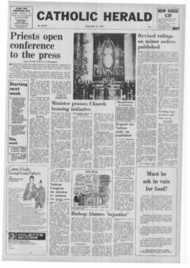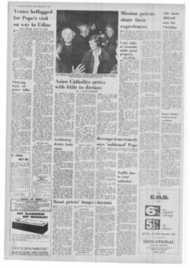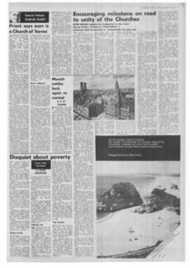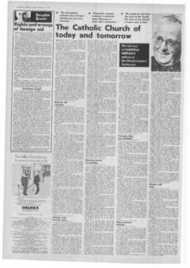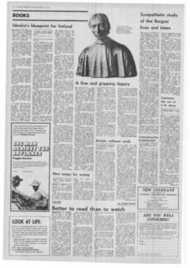Page 4, 15th September 1972
Page 4

Report an error
Noticed an error on this page?If you've noticed an error in this article please click here to report it.
Tags
Share
Related articles
Church 2000
Father David Mcgough
Battling For The Nation's Soul
Today's Education For Today
The Increasing Need For Priests
The Catholic Church of today and tomorrow
TODAY'S Church is more difficult to describe than tomorrow's. What the Church will then be like is literally anybody's guess. It is easy to speak of tomorrow because until tomorrow comes nobody can contradict. The Church of today is present and open to judgment.
All see the same Church but not the same picture. The post-Conciliar Church aptly illustrates the Aristotelian principle quidquid reelpitur ad modum recipientis recipitur, which, for the benefit of my Catholic colleagues now less accustomed to Latin, I translate loosely as "beauty is in the eye of the beholder."
The Church of 1972 'presents an aspect in many respects different from the church of 1962. The question we are going to ask ourselves is to what extent these changes have been for the better? The answer will depend on the outlook of the individual Catholic. For many—perhaps for most—the Second Vatican Council has been a triumph for the Holy Spirit. The Church, remper reformanda, has been reformed.
The old superior attitudes have gone. Cornplacency has been disturbed and false spiritual security undermined. That is one view. Other Catholics deplore much of what the Council has done. Solid doctrine, they say, has been displaced in favour of theological opinions. The old certainties and pieties have been destroyed. Authority. the greatest attraction of the Church of Rome, has been eroded from within.
This view is sometimes shared by those outside. the Roman obedience. An Anglican layman said to me a few days ago: "I know it sounds absurd coming from a Church which boasts of accepting all shades of opinion to say so, but many of us Anglicans did rather rely on you people to uphold standards of faith and morals in these permissive times."
Between the extremes
Between extremes there is the main body of unemotional Catholics. They do not write letters to the press. They distrust controversialists and put their faith in Christ's promise that his Church will never fail. These people take for granted that the Second Vatican Council was guided by God as surely as the first. Their kind of Catholic had small difficulty in accepting papal infallibility from the First Vatican Council and no more difficulty in taking ecumenism and liturgical reform from the Second.
There is a very general sketch of current opinion within the Church—enthusiasts, pessimists and, most of all, moderates. 1 now descend to details to give you a purely personal and tentative view. It is important to stress that I am not about to give what could be called an official view.
What follows is no more than one man's impression of what the Catholic Church looks like in the aftermath of the Council. I shall of course, be talking mainly of the Catholic Church in Britain since this is a Conference of the British Council of Churches.
The deepest effects are not always the most apparent. Thus what has affected the faithful most directly is the liturgical reform which despite prolonged and often bitter controversy is not of supreme significance. The two developments which have most affected Catholics are, in my view, ecumenism and discussion.
Of 'the two, discussion—words before and often instead of deeds—has had by far the greater impact. Ecumenism properly practised is uniformly good. Discussion is good only if it is productive. It is bad if it leads to paralysis or just more talking.
We shall look first at ecumenism. Before the Council. ecumenism had made progress in other Churches but was still the hobby of a few cranks in the Church of Rome. This was inevitable given the pre-Conciliar outlook of Catholics. We did not bear them any illwill or doubt their good faith but we thought of non-Catholics mainly in the terms of convertibility—an expression which had no reference to a debased currency.
As a corollary, Christian unity meant reunion with the Mother Church of Rome. In one sense this is still our understanding of ecumenism. The difference is that we now give the (term a connotation which Anglican and Free Church ecumenists also accept. In preCounciliar days a convert would talk of making his submission to Rome. Ecumenical Catholics no longer think—much less talk—of submission.
It is of the essence of true ecumenism to recognise that much of what divided Christendom was a difference of emphasis or even of semantics. Who for example, would have thought ten years ago that Anglicans and Roman Catholics could reach any sent of agreement o the Eucharist? Is it worth considering this agreement in a short parenthesis. Brought up to venerate the Elizabethan Martyrs who gave their lives for the Mass, most Catholics doubt the possibility of substantial agreement on the nature of the Eucharistic Sacrifice, The agreement reached, however substantial. was, of course only a partial agreement. To me it is a sign of God's grace that Anglican and Catholic theologians emerged from their meeting, breathing not anathemas but acts of faith in the Real Presence.
Definite steps towards unity
It was, so far as it went, a completely honest agreement. Anglicans did not pretend that they had found the word (transubstantiation in scripture. Catholics did not say that there is no difference between an evangelical Communion Service and the Holy Sacrifice of the Mass. What gives us reason torejoice is that Christians whose forebears shed each others blood over the Eucharist came together to honour the Eucharist.
Ecumenism is still in its infancy, but already it has taken definite steps towards unity. At one time it was alleged that prelates were holding back an eager laity. lit has now become clear that the prelates are usually anxious to press forward while the laity display greater caution in the ecumenical field. I do not know to what extent this is true of other Churches but 'in my community the clergy and the educated laity display the most enthusiasm.
This is only a way of saying that Catholics are most likely to become interested in ecumenism when they have the opportunity of
higher education. Other Catholics—and they are the great majority—are anxious to be friendly with non-Catholics 'hut not to warship in their churches. They have no interest in what we call the ecumenical dialogue. While we insist on using Greek instead of English words to describe bringing Christians together it is small wonder that the unlettered find television more exciting than ecumenism.
What is the effect of the present thinking within the Church on the main body of Catholics? They have been most directly affected by the changes in the Mass. At first most were against losing the Latin but they soon appreciated the value of 'having the official prayer of the Church in their mother tongue. Catholics of all grades of education regretted the loss of a common language in a multi-racial Church but did not think the price too high to pay for the vernacular.
On the ceher hand they, like the bishops at the Council, failed to foresee that Latin would virtually disappear from Catholic churches, At first there were Latin Masses in every parish, but today a Latin Mass has become a rarity. A few are passionately disappointed and have formed a society to save the Latin Mass. Some wistfully hope that Latin will come into its own again after our entry into the European Common Market.
The fact is that while some are emotionally disturbed by the loss of the Latin Mass most Catholics, both clerical and lay. are unreservedly grateful for the English Mass—though the discerning are pained by the frequently unmelodious translations. Language. however, was not the only problem. Such is the unpredictability of human nature that the faithful were more upset by the new regulations on standing and kneeling (bobbing-up-and-down they called it) than by the change of rubrics or the introduction of the vernacular.
I have said that. after ecumenism, discussion, or 'the cult of talk, is having the greatest effect on the church today. This phenomenon is not peculiar to the Catholic Church or to religious organisations. Discussion has become the standard method of ordering social action. This is true in politics, industry and education as well as in religion. It may be a reaction against dictatorship and the gentler tyranny called paternalism.
A reaction against the manner of exercising authority in the Catholic Church was clearly due. Bishops, superiors and, in lesser degree. parish priests could rule dioceses. communities or parishes in despotic fashion. This was accepted as a divine right conferred on anyone holding office. The voice of the superior was the voice of God.
If the office-holder was tolerant the system worked well. but not all 'in authority are both wise and holy, Many suffered as a result of olympic decrees, inhuman discipline and even positive injustice. It is now accepted that, whenever possible without breach of confidence, those in authority should give an explanation of what they propose to do.
The changed relationship between those in and those under authority is timely and beneficial. There is always. of course. the danger of going too far in promoting change. Some assume that nothing must be done without prolonged discussion. The operative word is "prolonged." It is good that authority should be regarded as a shared responsibility.
All authority is from God. It is not given for the satisfaction of the few holding office but for the good of all. Consultation is excellent and necessary provided discussion is not allowed to inhibit action. When we wish to avoid action the venerable English custom is to appoint a committee. In the ecclesiastical world a new custom has arisen.
Growing number of meetings
It is no longer a question of forming a committee to prevent action. Now, whenever the need for urgent action is admitted, a committee (usually called a commission) is formed or a conference is arranged. Clergy—and especially bishops—can spend a major part of their time at meetings. There are parish councils, deanery councils, diocesan councils ofadministration, schools commissions, liturgical commissions, ecumenical commissions, senates of priests and pastoral councils.
There are frequent meetings of the heirarchy and of national commissions for education, seminaries, theology, the laity, liturgy, justice and peace, social welfare, religious Life and foreign missions. All of these commissions have their quota of bishops and priests. Not to be outdone 'by the local Church, the Holy See regularly summons bishops from the six continents 'to Rome for international commissions, conferences and synods. This view of mine is 'presented in lighter vein but I seriously believe that much of our pastoral effort is 'being stifled by the growing number of meetings, discussions and conferences to which bishops and priests are subjected. I also foresee a new hazard. An alarming number of university students are now opting for courses in sociology and this is almost certain to bring requests for fresh surveys. The chief danger of stockpiling armaments is the temptation it provides to use them. There is no end to the investigations that can 'be made on questions of 'belief, discipline, ethics and worship. Opinion polls and clergy popularity contests 'may one day become part of Church life. Television one day may run an election for "priest of the year" or for the title of "Father U.K." Here is an example from the Church abroad of the urge to compile statistics and record opinions.. A comprehensive survey has recently been completed by sociologists for the Catholic Church in West Germany. The bishops have been told what one-fifth of their flock of 21 million souls are said to think. Twenty per cent of the Catholics in West Germany filled up forms. The answers reveal that 45 per cent have difficulties about contraception and 39 per cent about the Pope. Sex worries 30 per cent and indissolubility of marriage is found unattractive by 26 per cent. Lapsed as well as practising Catholics took part in the survey, but I do not know if their opinions were given equal weight. Of those who go to Mass regularly nearly 90 per cent want their children to be given religious instruction.
I am sure that these results did not surprise the bishops and I am doubtful of their value in planning future pastoral strategy. Reports of this survey—like reports of most surveys— gave samples as absolute percentages. In other words the views of 20 per cent of German Catholics became the views of all German Catholics. I have quoted the example of this German exercise because surveys and the study of the findings of surveys may soon threaten what clerical time remains over from conferences, commissions and discussions.
It is not easy to give a realistic account of the Catholic Church in Britain today. It would need to describe all the activities in which its members are engaged. It is not enough to quote the numbers attending Mass on Sundays.
Perhaps the spiritual health of the Church can be measured more reliably by the number of daily communicants than by the number of those making their Easter duties.
It is more likely still that such statistics are a less reliable guide to our spiritual health
than the number of Catholics engaged in works of mercy. The thousands of men in the Society of St. Vincent de Paul, which works exclusively
for the poor and destitute, may provide the best test of all. We simply do not know the state of the Church. The state of any Church is known only to God.
Our membership is so mixed that it is difficult to gauge progress. Many immigrants Italians, Poles, Ukranians, Spanish, Africans, Asians and, above ail, Irish attend Sunday
Mass. Despite the sacrifices parents make to
build schools there are many children of both immigrants and natives who have 'no chance of a Catholic education. This may have an effect on the quality of Catholic life in the next generation. We do not know.
At present we can say that numericallyfor what that is worth--we are more than holding our own. New churches and schools are being built in every diocese and in most parishes the existing churches are well attended several times each Sunday. It is impossible to discover precise figures because parishes are taxed on their Mass attendance and parish priests are liable to underestimate rather than exaggerate the figures on which they have to pay.
If Sunday Mass was abolished ...
One large church in Kilburn where the Irish immigrant population is especially high has no less than 15 Masses on Sunday from seven in the morning until eight o'clock in the evening. The Mass attendance in that parish is 10,000 each Sunday. Yet it is important to say that it is no proof of religious fervour. Catholics are bound to go to Mass on Sundays and Holy days.
If the obligation were removed 1 am sure that we would not retain our crowded churches for long. When fish on Friday became optional few continued the practice of Friday abstinence. It is a fact of life that most of us are not disposed to do what is good for us unless it is made a matter of duty.
I must turn to another feature of our Catholic life. The laity are now taking a greater share in the organisation of Church activity. By laity I mean, of course the enthusiasts among the laity. Even practising Catholics usually take no part in Church life beyond attending Mass and receiving Holy Communion on Sundays. Parish councils are a novelty but there is no mad rush among parishioners to be elected.
The idea of sharing responsibility with the clergy is excellent but most laity still prefer to leave the priests to run the parish. The laity are free not to accept responsibility for administration, and the vast majority exercise that freedom. Clergy are less free. They are now expected to spend a great deal of time sharing responsibility. Some wear themselves out discussing how this is to be done and lose their appetite for the ordinary pastoral round_ That is why I diagose discussion as one of the great weaknesses in the Church of today. Without delaying to develop the point I mention in passing that apart from pastoral work the great casualty in the war of words is prayer. People who talk excessively rarely pause to listen to God in prayer.
Another feature of the contemporary Church is the confusion which has come 'through the weakening of confidence in the magisteriunt. No picture of the Church would be complete which did not take into account the damage done after the publication of the encyclical Humanae Vitae. It was not the encyclical itself so much as its reception which wounded the Church. It is true that many bishops as well as priests and laity thought that in good conscience the Pope might be able to sanction the use of contraceptives in certain circumstances.
Unprecedented defiance
There was talk of a Catholic pill, though not even the most eager liturgists actually composed a ritual blessing for it. When the Pope gave such lengthy consideration to the report of the commission set up to examine the issue some concession seemed likely. If the Pope were going merely to reiterate existing doctrine, it was argued, there could be no explanation for so long a delay.
In the event the only change was in the more gentle and compassionate terms Pope Paul employed in restating the teaching of his three predecessors—Pius XI, Pius XII and John XXIII. For many the encyclical was a surprise and disappointment but it was not a shock. It is more likely that a contradiction of the well-known teaching would have been found shocking, but it is idle to speculate about what might have happened.
We know what in fact did happen. A num her of priests and laymen defied the Pope. Such behaviour was unprecedented in the welldisciplined Church of the twentieth century and the Church has not recovered and may rever fully 'recover from the shock.
The revolt was not against the doctrine of eapel infallibility. The Holy See had made it .sear at the moment of its promulgation that there was no question of this encyclical being infallible document. Until this time pronouncements by the Pope on moral and social issues had been accepted by the whole Church. ne magisterium or teaching authority of the es se is normally exercised by encyclical, inE,ruction or rota proprio.
Some documents have been regarded as trivial or ill-advised—for example, Veterum Sapienlia n which Pope John decreed that all theological :ectures in seminaries must be given in Latin. It is one thing to disregard lightweight documents but entirely different to denounce a solemn pronouncement. In considering the Church of Rome today it is impossible to estimate the effects on ordinary priests and people of this revolt against papal authority. Permit me now to say a brief word about the Church of tomorrow. This is guesswork and tnerefore of little importance. Rather than prophesy I prefer to say what with optimistic vision 1 hope to see. I confine myself to the same two points I have considered in' the first part—discussion and ecumenism.
look for a radical curtailment of meetings and conferences. I sincerely believe that in addition to sapping physical energy the present burden of talk induces a weariness of the spirit leading to narcissism and neglect of personal prayer. It is fatally easy for priests and religious to become so concerned with their own selffulfilment that they forget their primary duty of self-giving and self-denial. I think it likely that many who have left the priesthood or the religious life would still be with us if they had not dissipated their zeal in endless talking. Nobody who has taken up the cross should lay it down. No priest who has served the poor, the sick and dying, the old and the young should need to ask what a priest is for. The so-called crisis of identity is an entirely bogus reason for laying down the burden of priesthood. No follower of Christ having put his hand to the plough and looking back is fit for the Kingdom of God. (Lc, IX, 62.)
In the Church of tomorrow priests grown tired of talking will have returned to work. The love of our Catholic people for their priests remains strong and touching despite the pain inflicted on the best of them by clerical defections. In such investigations as have been carried out -notably by a nationwide survey by the Laity Commission--the chief complaint of Catholic people is that families no longer see the priests regularly in their homes.
This is eloquent testimony to the toys: the Catholic people have for their priests. Such love is less evident in countries where there is no tradition of home visiting. Priests have now begun to offer Mass in the 'homes of their parishioners and this will bring about a renewal of pastoral contact. The old saying remains true that a house-going priest makes a churchgoing people.
One of the most important questions facing the Church of tomorrow is theological. Ecumenism will obviously have its effect on theological trends in all religions. That, indeed, is one of 'the primary objects of ecumenism. It has already altered Catholic thinking but it may bring another kind of development.
Heretics still exist
Although for ecumenical reasons the word 3eretic is never used today. heretics still exist. The chief heresy is what we used to call modernism. In dealing with it the methods of Pope Pius X would no longer be possible or desirable. I think that modernism is returning and hat it will reappear as the chief threat of the Church of tomorrow.
Since authority and every kind of establishment have become universally unpopular the climate was never more favourable for a renewed attack on the authority of God and the magisterium of his Church.
The Resurrection, the Blessed Trinity, the immortality of the soul, the Sacraments, the Sacrifice of the Mass_ the indissolubility of marriage, the right to life of the unborn, the senile and the incurably sick. All these doctrines taken for granted by Catholics until now are likely to be attacked from within the Church of tomorrow.
According to press reports this year's Conference of Modern Churchmen decided to offer membership to some Catholics. That would have been unthinkable in the Church of yesterday but it is an indication of the problems which the Church of tomorrow may be facing. Modernism is already showing its face in the current writing of popular theologians, of whom some have clearly ceased to believe that Christ is truly God.
1 end by declaring that I regard ecumenism as the greatest blessing to have come from the Council. There were other benefits but most of them--for example the impetus to further biblical study--were the fruit of the ecumenical outlook. Catholics now see that something can be learned from separated brethren. The Churches of tomorrow will, I believe, grow closer together.
In God's good time we shall talk not of the Churches but of one Church. This, at least, seems certain--Christians will never return to the old rivalries and enmities. As religious belief declines in the West they wilt unite in an evangelical spirit to preach Christ to their brethren and lead them to the One Holy Catholic and Apostolic Church.
blog comments powered by Disqus


